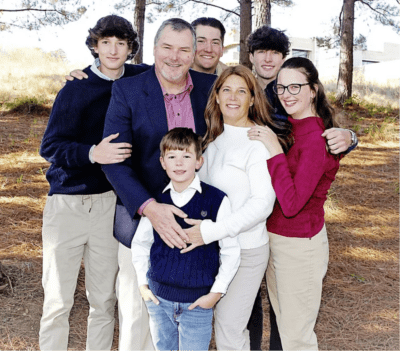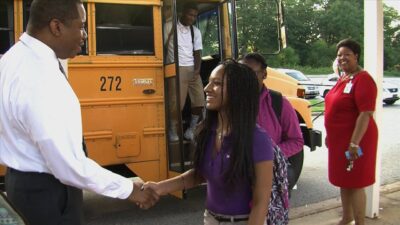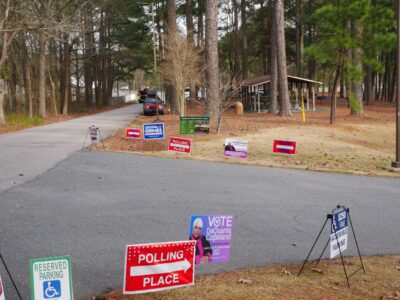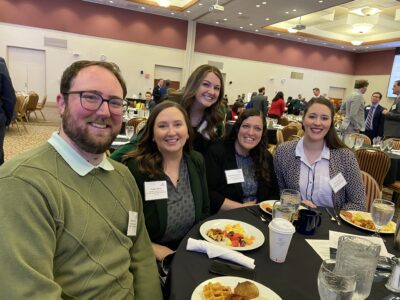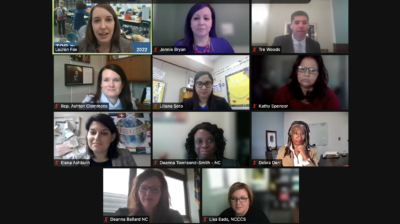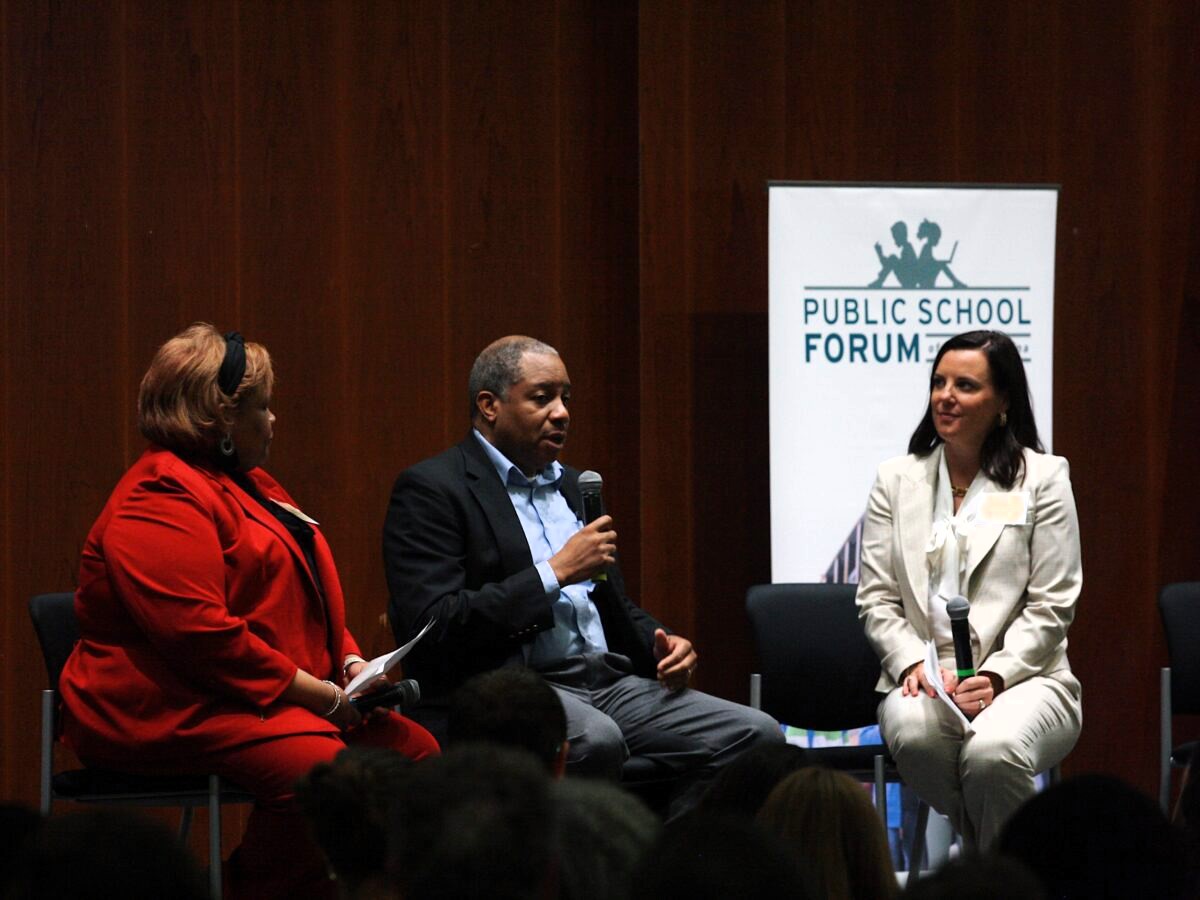
|
|
More than 400 teachers, administers, elected officials, and other education stakeholders gathered in Raleigh on Tuesday for the Public School Forum’s 10th annual Eggs & Issues breakfast — focused this year on the need for nonpartisan and bipartisan efforts to support public education.
“We believe that nonpartisan and bipartisan discussions are critical to moving forward for kids,” said Public School Forum Executive Director Dr. Mary Ann Wolf. “However, we are not neutral about public schools. Public schools matter — they are at the heart of our communities.”
Ahead of the 2024 election, the event featured candidate forums on the state superintendent, General Assembly, and gubernatorial races.
State Superintendent Catherine Truitt, who lost the Republican primary to candidate Michele Morrow, urged attendees to hold education and state leaders to high standards. Morrow, a nurse and homeschool educator, declined to attend the forum or to submit a recorded interview, Wolf said.
Ahead of the election, Truitt said leaders must focus on more than just “buzz words” when it comes to education, “doing away with what sounds good in favor of doing good for students.”
“We are at a critical juncture. There’s a big election ahead of us,” Truitt said. “The stakes are high, because we’re trying to recover from the greatest disruption to education in our country’s history, while the very nature of what it means to be workforce ready is changing by the day.”
Truitt ended with a few “hard questions” for attendees to ask of current and future education leaders:
- How will you navigate political pressures among different stakeholders to prioritize the best interest of students?
- How will you engage with parents, community members, and others to build trust, gather input, and foster collaborative decision making when many of these entities disagree with one another?
- If you are provided additional resources, do you have targeted plans to spend it in a way that will result in better outcomes for students?
- When was the last time you met with educators, a local superintendent, or principal? Or even more importantly, when was the last time that you entrusted your child to a North Carolina public school?
- What is your vision, and how will you lead and inspire educators, administrators, and stakeholders to implement this vision effectively?
Truitt said these types of questions will help make nonpartisan and bipartisan conversations about education possible.
“Education is beautifully important and complex, and it enables and empowers students to be who and what they want to be,” Truitt said. “It is so much bigger than what can be boiled down to a few talking points.”
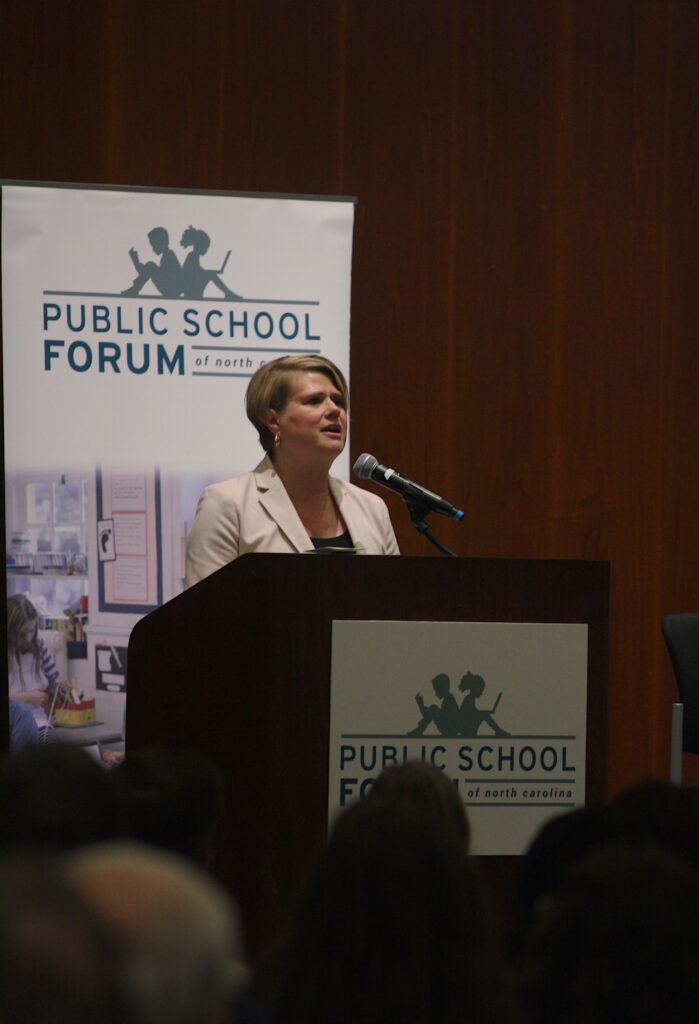
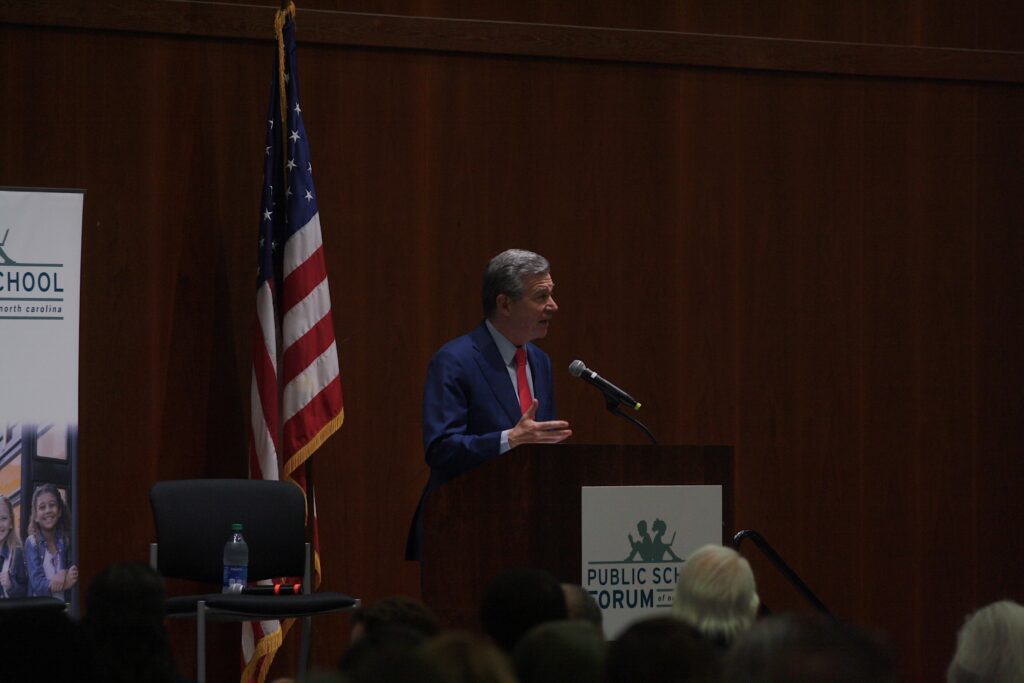
Democratic Gov. Roy Cooper, who is currently serving his second and final term as governor, called on the need for more public school funding during his opening remarks for the event.
Specifically, he called for the moratorium of more funding for private school vouchers until public schools are “fully funded.”
Cooper said North Carolina residents must reach out to their legislators — letting lawmakers know good things are happening in their public schools.
He also called for lawmakers to prioritize better pay for teachers and expand access to early childhood education. Both priorities were included in Cooper’s budget proposal, released in April.
“A private school education is not constitutionally mandated — a public school education is,” Cooper said. “… The future of our state goes to class in a public school. We have to invest in that future.”
The Public School Forum also gave an update on the organization’s “top education issues” for 2024-25:
- Ensure fair and competitive compensation for educators. The forum is calling for a 24.5% raise for educators during the biennium.
- Grow, retain, and diversify the teacher pipeline. Among other things, the forum wants to see the North Carolina Teaching Fellows Program expanded to all subjects and grade levels, and in partnership with every approved Education Preparation Program (EPP) in the state.
- Address the root causes of mental health and school safety crises. Specifically, the forum is advocating for the state to provide funding to hire the recommended ratio for social workers, psychologists, and school counselors.
- Prepare students for the world they live in. The forum highlighted the need for a better school accountability model, and the incorporation of social emotional learning and culturally responsive pedagogy in schools, among other things.
- Implement, monitor, and evaluate the Comprehensive Remedial Plan (part of the Leandro case). According to the forum, about 7% of the plan has been funded so far.
Dr. Lauren Fox, the forum’s senior director of policy and research, briefly walked attendees through each priority, including any recent progress for each.
“Overall, we found that while there has been some progress in some areas, we’re still far from meeting the needs of our students,” Fox said. “None of our metrics have been fully met. But I want to note that we still have time, so we’re very hopeful for this short session.”
The short session started on April 24. You can read EdNC’s analysis of education issues likely to come up during the short session here.
State superintendent forum
The race for superintendent of public instruction in North Carolina is between Republican Michele Morrow and Democratic Maurice (Mo) Green.
As mentioned above, Morrow declined to participate in the forum. Throughout the morning, a Morrow campaign van was intermittently present in the event’s parking lot.
Green, an attorney and former superintendent of Guilford County Schools, said he decided to run for state superintendent shortly after Republicans announced the expansion of the Opportunity Scholarship program last long session. While “sitting on the sidelines,” he said he was worried about the direction of public schools in North Carolina.
“I’m deeply concerned about the dismantling of public education,” Green said.
Green said he was also concerned about student achievement gaps and “the belittling of our educators and our teachers.”
In North Carolina, the Department of Public Instruction (DPI) is “charged with implementing the state’s public school laws for pre-kindergarten through 12th grade public schools at the direction of the State Board of Education and the Superintendent of Public Instruction.”
The superintendent oversees DPI, which has more than 1,000 employees.
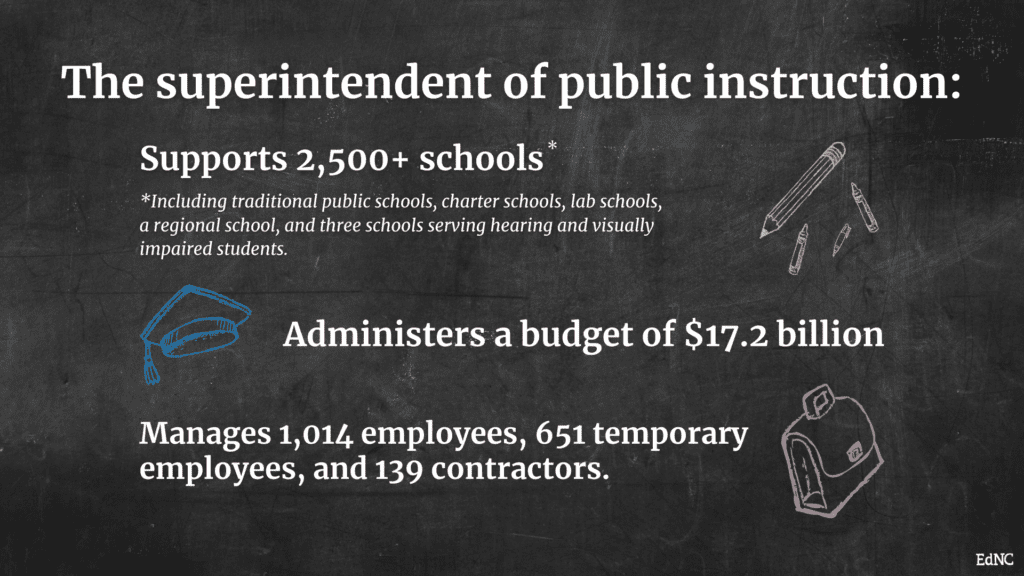
On Tuesday, Green said if elected, he would lead DPI using a “listen, learn, and then lead” approach. In his role as a superintendent, he said he focused on promoting both excellence and accountability.
“I have been blessed to work with amazing folks over the years, and the best thing I can do is hire well and get out of the way,” Green said. “…We can do amazing things, I believe, in the department.”
Green said he understands the role of superintendent not as a politician, but as “the chief administrative officer for North Carolina and for our children, and to be the chief advocacy officer.”
When Green resigned from GCS, he was hired to be the executive director of the progressive Z. Smith Reynolds Foundation (ZSR). He served there from 2016 until 2023.
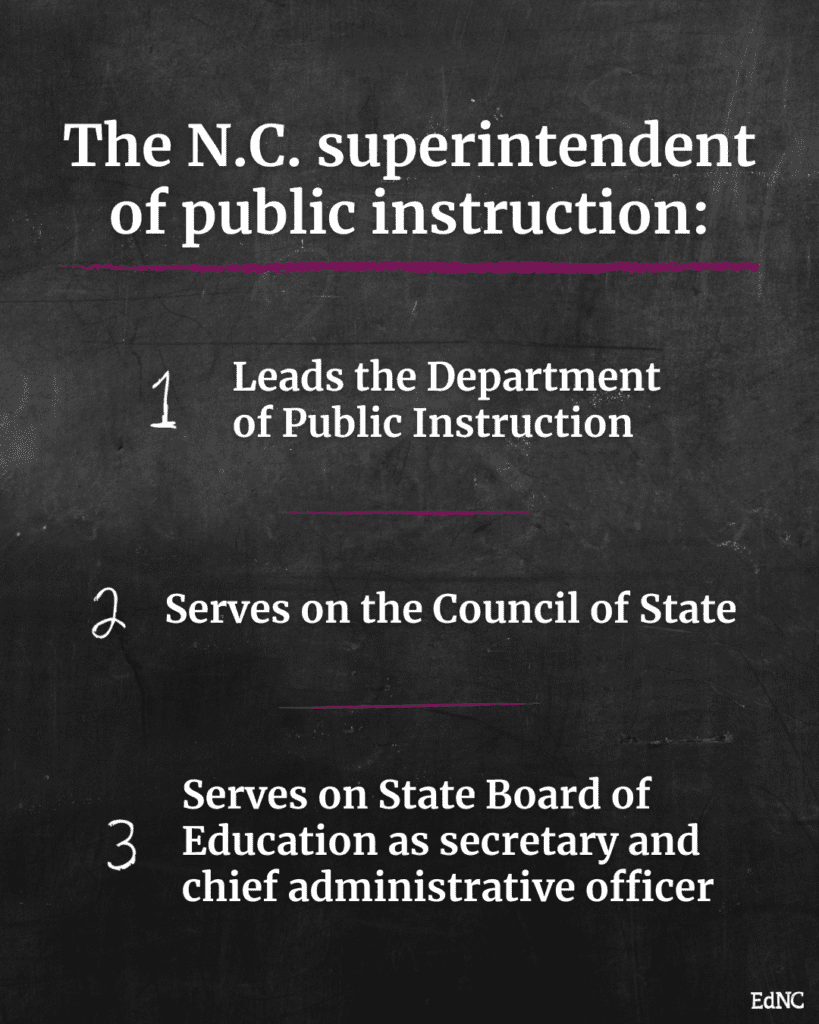
On Tuesday, he said the foundation has “served this state remarkably for more than 80 years in a number of different areas, including public education.” He said continued Leandro litigation is possible due to the foundation, which he said funds the low-wealth plaintiff districts in the case.
Green said his passion for education comes from his mother, who became a special education teacher when he was 10 years old.
“I revere educators,” Green said.
If elected, Green said he would continue DPI’s current work on early literacy. However, he said he will advocate for financial compensation for any future required literacy professional development. DPI did not require local districts to use some of their flexible science of reading training funds toward teacher compensation.
He also said his team would focus on “character development, along with academic outcomes” — in line with Truitt’s Portrait of a Graduate framework.
Read more about the superintendent race
Governor’s forum
Current Lt. Gov. Mark Robinson won the Republican primary for governor. On Tuesday, Robinson said education is critical to the state’s economy.
“Education is the number one thing that you have to have, because it literally is going to determine the future of the state,” he said.


If elected, Robinson said three specific education priorities he would push for are:
- Prioritizing “the basics” of reading, writing, and math, particularly in elementary schools.
- “Treating teachers better.” Robinson said this includes paying teachers better, but also making sure they are safe and supported in the school building.
- Ensuring students are more career ready and prepared for whatever postsecondary path they take.
Robinson said, if elected, his team would also focus on adult education.
Finally, Robinson highlighted the need for “being mature in politics” in order to have collaboration.
“It’s so important to leave politics out of this, and invite people of all political stripes to the table to bring all the great ideas that we have to the table… and after having that conversation, come to a consensus where we can find the best solution for our students, because that’s what we’re all searching for here,” he said. “We’re not searching for political answers. We’re searching for answers of how to deliver excellent education to our students.”
Josh Stein won the Democratic primary for governor and has served as North Carolina’s attorney general since 2017. He recorded a virtual interview with the forum, which played on Tuesday, due to attending the annual North Carolina Peace Officers Memorial Day ceremony.
The forum asked Stein the same four questions it asked Robinson.
Stein also said education is important to the state’s economy, but said he worries industries will start pulling out of North Carolina if they don’t have confidence in its education system.
“There is no greater priority for the state of North Carolina than to do an excellent job educating the young people of North Carolina,” Stein said at the start of his video. “Youngsters are our future.”
Here are the three education priorities Stein said he would push for if he is elected:
- Funding schools through the Leandro plan.
- Educator recruitment and retention efforts, including an increase in teacher pay, the reinstatement of master’s pay, and increasing the number of school support faculty and staff (nurses, counselors, psychologists, teacher’s assistants, etc).
- School mental health supports and safety initiatives (specifically gun safety protections).
“We have to invest in (our children) and their futures,” Stein said. “It’s gonna require a coalition of us to change the priorities of the legislature… we need them to pour into our public schools.”
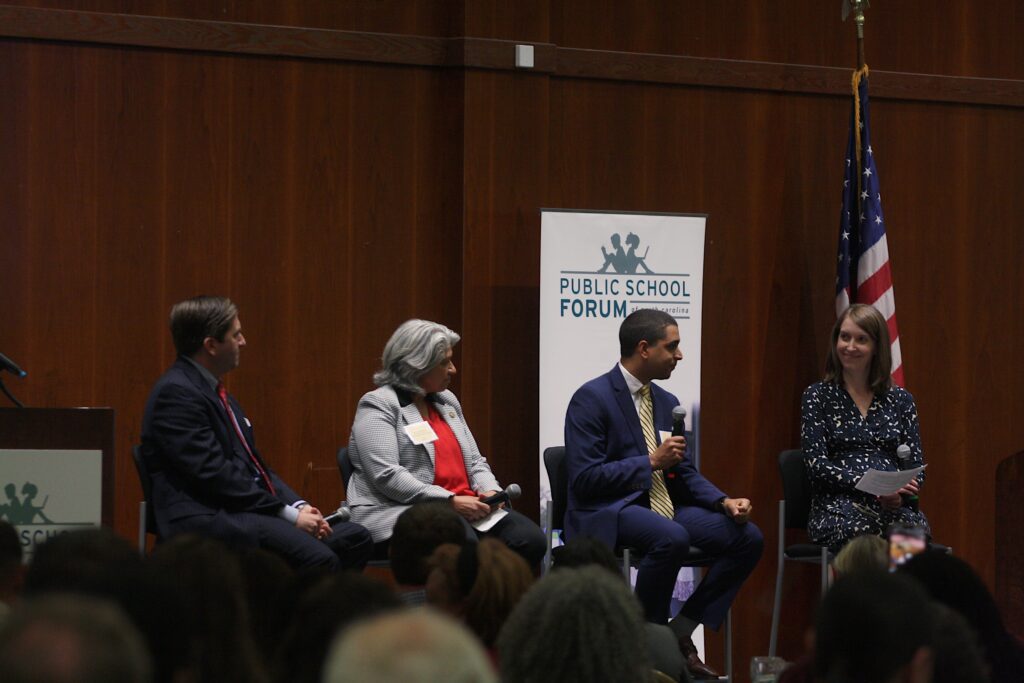
General Assembly forum
The Eggs & Issues breakfast also included a forum with several candidates running for the state legislature:
- Dr. Scott Lassiter, a Republican running to represent District 13 (Wake County) in the state Senate. Lassiter has worked as an educator and school administrator, and currently works as principal of Connections Academy Middle School.
- Sen. Lisa Grafstein is the incumbent Democratic senator candidate for District 13.
- Dante Pittman is a Democrat running to represent District 24 (Wilson and Nash counties) in the state House of Representatives. (Rep. Ken Fontenot, the incumbent Republican for the race, was supposed to attend the forum but canceled last minute due to a scheduling conflict.)
Each of the candidates said the General Assembly must invest more in the state’s public schools.
“I believe that we are facing one of the most consequential elections in our state when it comes to the future of public education in North Carolina,” Grafstein said.
She said the Wake County Public Schools changed her son’s life, who has autism and received special education services. However, she said she still had to seek some private services because “the schools were stretched for some of the services that we needed.”
Grafstein said she appreciated Truitt’s words about avoiding buzz words, but also “want to be clear that Leandro is not a buzz word — it’s the basic, bare minimum.” In addition to funding the Leandro plan, Grafstein said she supports the teacher raises and restoration of master’s pay outlined in Cooper’s budget proposal.
Grafstein said she would also like to see the General Assembly fund a nurse in every school.
Lassiter said education often gets short-changed “in this hyper-partisan environment we live in.”
“There are some things that are too important to play politics, there are some things that transcend party lines,” he said. “And that should be our investment in our North Carolina public schools.”
Lassiter said the General Assembly, including his fellow Republicans, must do more to respect and support teachers. If elected, he said he will be “laser focused” on providing more content resources for educators, in addition to teacher compensation.
Pittman, who is 28, said his public school education had a significant impact on his life.
If elected, he said he will focus on pushing for the expansion of Pre-K and funding more teaching assistants in schools.
“It’s going to start with all of us here making this the primary issue, because there’s nothing more important to the state of North Carolina than to make sure we fully fund public education,” Pittman said.
What’s next?
At the end of the event, the the Public School Forum invited attendees to fill out “next steps.”
The handout asked: “What are five things you can do to support NC’s public school students this year?”
Thomas Oxholm, executive vice president of the Wake Stone Corporation, encouraged attendees to invite business leaders to visit public schools.
Charles Bowman, former president of Bank of America in North Carolina, spoke about “the fierce urgency of now” when it comes to public education and our future economy.
The breakfast concluded with four different breakout sessions:
- Teacher recruitment, retention, diversity, and pay.
- School safety and mental health.
- Preparing students for the world they live in.
- School funding.
The Public Forum’s Wolf said the team wanted the day to be all about “what we do next.”
“We also are here to inspire meaningful action,” Wolf said. “We have to act… the 1.4 million students in North Carolina and the future students of North Carolina depend on you.”
Editor’s note: This article was updated to correct Thomas Oxholm’s last name.



